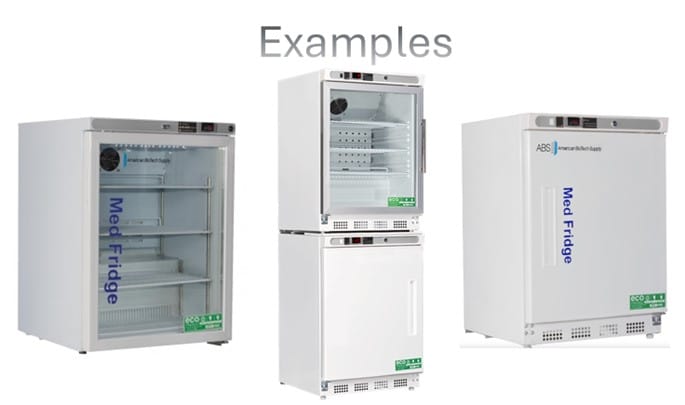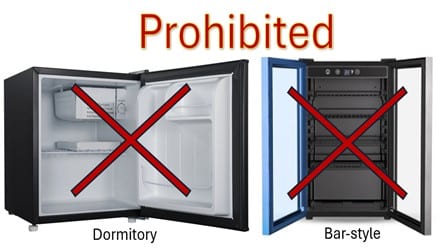It is important that your facility has proper storage unit(s) with enough room to store the largest inventory a provider location might have at the busiest point in the year without crowding, and have monitoring equipment that is set up correctly, maintained appropriately, and repaired as needed. This equipment protects patients from inadvertently receiving compromised vaccine, and your facility against costs of revaccinating patients, replacing expensive vaccines, and losing patient confidence in your practice.
Storage Unit Placement
Good air circulation around the outside of the storage unit is important. Place a storage unit in a well-ventilated room, leaving space between the unit, ceiling, and any wall. Nothing should block the cover of the motor compartment. The unit should be firm and level, with the bottom of the unit above the floor. Make sure the unit door opens and closes smoothly and fits squarely against the body of the unit. If not secured properly, unit doors pose a particular risk to maintaining appropriate internal temperatures of vaccine storage units. Studies find most units work best when placed in an area with standard indoor room temperatures, usually between 20° C and 25° C (68° F and 77° F). Check the manufacturer-supplied owner’s manual for additional guidance on placement and spacing.
Provider Responsibilities
- Stand-alone refrigerators and freezers should be used to store VFC vaccines.
- If a refrigerator/freezer combination unit is in use, the freezer portion of the unit should not be used to store frozen vaccines. The refrigerator portion of the combo unit can be used to store refrigerated vaccines, and a standalone freezer unit should be used to store frozen vaccines.
- Ensure there is a digital data logger for each vaccine storage unit storing federal vaccine.
- Assess and record temperatures twice a day. Specifically, assess temperatures before using vaccine at the beginning of the clinic day. This is required even if a data logger is in use.
- Assess and record minimum and maximum temperatures each clinic morning and clear the minimum and maximum temperature readings each morning (required).
- As currently required, report all vaccine excursions to the VFC Program.
- Document information about the excursion and what steps were taken to correct any issues.
CDC strongly recommends the use of stand-alone refrigerator and freezer units, meaning a self-contained unit that only refrigerates or only freezes and is suitable for vaccine storage. These units can vary in size, from a compact, under-the-counter style to a large, stand-alone, pharmaceutical-grade storage unit. The transitional use of standard domestic combination refrigerator/freezer units is appropriate only for the refrigerator portion, but its continued use is discouraged. The use of dormitory or bar-style refrigerator/freezers (small refrigerator units with interior freezer sections) is no longer allowed at any time for Vaccines for Children (VFC) program providers.
Storage Units
Vaccine units are available if different types.
- Stand-alone: These types are self-contained units designed as either refrigerator-only or freezer-only and range in size from compact, under-the-counter styles to very large pharmaceutical-grade units.
- Combination: These types have both a refrigerator and a freezer with separate exterior doors.
- Pharmaceutical: These purpose-built grades are specifically designed to maintain consistent temperatures for storage of vaccines or biologics in pharmacy, biologics, or laboratory settings.
- Commercial: These grades are intended to store food and beverages in commercial settings. They are often larger and more powerful than household units but are not designed to store biologics and experience some temperature fluctuations.
- Household: These grades are intended for food storage, typically in homes and offices.
Manufacturers and Distributions of Biologic-Grade Units
The manufacturers and distributors below are examples of some that you may wish to consider for safe vaccine storage in your practice. Please note that the Arkansas VFC Program does not endorse or recommend specific products or brands.
- Aegis
- American Biotech Supply
- Compact Appliance
- Fisher Scientific
- Follett
- Helmer
- Lab Research Products
- Living Direct
- Migali Scientific Refrigeration
- Thermo Scientific

NOTE: The use of dormitory or bar-style refrigerator/freezers is always prohibited for VFC program provider locations.



